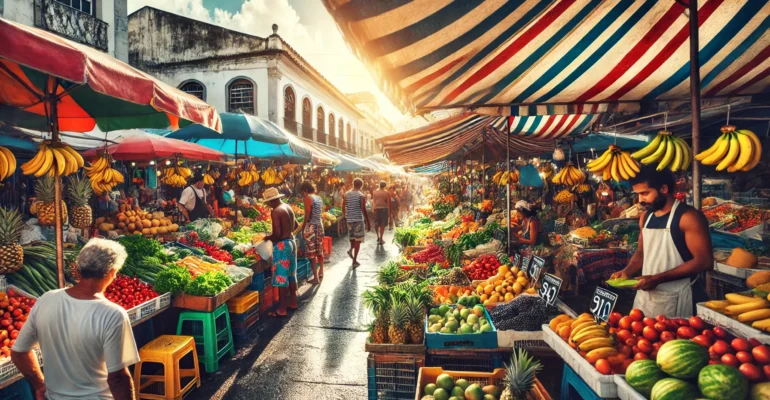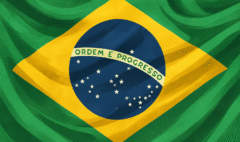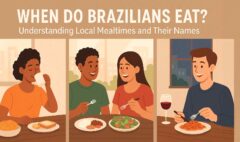Essential Market Vocabulary You Need in Brazilian Portuguese
Essential Market Vocabulary You Need in Brazilian Portuguese
Introduction
Planning to explore Brazil like a local? One of the best ways to dive into the culture is through its vibrant markets—places full of color, smells, noise, and, of course, language. Whether you’re shopping for fresh fruit or just soaking up the atmosphere, having the right vocabulary makes all the difference. Let’s make sure you’re ready to navigate any feira with confidence!
Understanding the Market Culture in Brazil
Open-Air Markets vs Supermarkets
In Brazil, open-air markets, or feiras livres, are a weekly event in most cities and towns. They’re packed with vendors selling everything from bananas to beans to beach towels. In contrast, supermarkets (supermercados) are more structured and modern, but they lack that warm, local feel.
Regional Diversity and Market Vibes
A market in Bahia feels totally different from one in São Paulo. Local ingredients, accents, and customs vary, so learning market vocabulary also helps you understand Brazil’s rich regional diversity.
Basic Market Terms
General Words for “Market”
-
Mercado – market (general)
-
Feira – street market/fair
-
Quitanda – small produce store or stand
Vendor and Buyer Terms
-
Feirante – market vendor
-
Vendedor(a) – seller
-
Cliente or comprador(a) – buyer
Common Verbs
-
Comprar – to buy
-
Vender – to sell
-
Pagar – to pay
-
Custar – to cost
Fruits and Vegetables Vocabulary
Fruits
-
Banana – banana
-
Maçã – apple
-
Abacaxi – pineapple
-
Laranja – orange
-
Manga – mango
Vegetables
-
Tomate – tomato
-
Alface – lettuce
-
Cenoura – carrot
-
Batata – potato
-
Cebola – onion
Describing Freshness and Quality
-
Fresco(a) – fresh
-
Maduro(a) – ripe
-
Verde – unripe
-
Orgânico(a) – organic
-
Doce – sweet
-
Azedo(a) – sour
Weights, Prices, and Measurements
Units of Weight
-
Quilo – kilogram
-
Grama – gram
-
Meio quilo – half a kilo
Talking About Prices
-
Quanto custa? – How much does it cost?
-
Está caro. – It’s expensive.
-
Está barato. – It’s cheap.
-
Tem desconto? – Is there a discount?
Vocabulary for Payment
Payment Methods
-
Dinheiro – cash
-
Cartão – card
-
Pix – instant bank transfer (very common in Brazil)
Expressions for Asking and Offering Change
-
Tem troco? – Do you have change?
-
Pode deixar o troco. – You can keep the change.
Polite Phrases and Useful Questions
-
Com licença. – Excuse me.
-
Por favor. – Please.
-
Obrigado(a). – Thank you.
-
Pode me ajudar? – Can you help me?
-
Onde fica o mercado? – Where is the market?
Talking About Food Items Beyond Produce
Meats, Cheeses, Bread
-
Carne bovina – beef
-
Frango – chicken
-
Linguiça – sausage
-
Queijo – cheese
-
Pão francês – Brazilian-style roll
Spices and Pantry Essentials
-
Arroz – rice
-
Feijão – beans
-
Farinha – flour
-
Açúcar – sugar
-
Sal – salt
Describing What You Want
Quantities
-
Um pouco de – a little of
-
Muito – a lot
-
Metade – half
-
Uma dúzia – a dozen
Preferences and Dislikes
-
Eu gosto de… – I like…
-
Eu não gosto de… – I don’t like…
-
Prefiro esse. – I prefer this one.
Understanding the Vendor’s Language
Common Vendor Phrases
-
É bom, pode levar! – It’s good, take it!
-
Promoção hoje! – Sale today!
-
Tá barato, freguês! – It’s cheap, customer!
Regional Slang in Markets
In Rio: “Merreca” for cheap stuff
In the Northeast: “Moça” or “moço” to call attention politely
In São Paulo: “Tá na mão” – literally “it’s in your hand,” used to close a deal
Survival Phrases for Tourists
-
Eu não falo muito português. – I don’t speak much Portuguese.
-
Pode mostrar pra mim? – Can you show me?
-
Posso experimentar? – Can I try it?
Tips for Navigating a Brazilian Market
Cultural Dos and Don’ts
-
Do greet the vendor – a friendly bom dia goes a long way
-
Don’t touch the produce without asking
-
Do carry small change
-
Don’t haggle too aggressively – it’s not always welcomed
When to Go and What to Expect
-
Go early for the freshest produce
-
Expect crowds, loud voices, and plenty of smells
-
Many markets wrap up by midday
Practice Sentences and Dialogues
Example Conversation
You: Quanto custa esse mamão?
Vendor: Dois reais o quilo.
You: Me vê dois quilos, por favor.
Vendor: Claro! Mais alguma coisa?
Vocabulary in Action
Create flashcards or practice dialogs. Even better? Go to a real market and try using these words!
Learning and Retaining Market Vocabulary
Flashcards, Apps, and Immersive Learning
-
Use apps like Anki or Quizlet
-
Try Duolingo or Memrise for repetition
-
Practice aloud or record yourself
Practice Through Real-Life Interaction
-
Visit local markets
-
Watch Brazilian YouTube videos about shopping
-
Talk to Brazilian friends or tutors
Sample Market Dialogues in Brazilian Portuguese
🛍️ Dialogue 1: Asking for the Price
Portuguese:
— Bom dia! Quanto custa esse abacaxi?
— Bom dia! Três reais a unidade.
— Tá bom. Vou levar um, por favor.
English:
— Good morning! How much is this pineapple?
— Good morning! Three reais each.
— Okay. I’ll take one, please.
🥦 Dialogue 2: Buying Vegetables by Weight
Portuguese:
— Quero meio quilo de cenoura, por favor.
— Claro! Mais alguma coisa?
— Sim, tem batata-doce hoje?
— Tem sim! Tá fresquinha!
English:
— I’d like half a kilo of carrots, please.
— Sure! Anything else?
— Yes, do you have sweet potatoes today?
— Yes, we do! They’re fresh!
💳 Dialogue 3: Talking About Payment
Portuguese:
— Aceita cartão?
— Aceito sim. Débito ou crédito?
— Débito, por favor.
— Pode inserir aqui. Obrigado!
English:
— Do you accept card?
— Yes, I do. Debit or credit?
— Debit, please.
— You can insert it here. Thank you!
🍊 Dialogue 4: Expressing Preferences
Portuguese:
— Essa laranja tá doce?
— Tá sim, experimenta essa aqui!
— Hum, tá uma delícia. Me vê um quilo, por favor.
English:
— Is this orange sweet?
— Yes, it is! Try this one!
— Hmm, it’s delicious. I’ll take a kilo, please.
📦 Dialogue 5: Asking for Something Specific
Portuguese:
— Você tem alho poró?
— Hoje não chegou, só amanhã.
— Ah, tudo bem. Então vou querer salsinha e cebolinha.
English:
— Do you have leeks?
— They didn’t come today, only tomorrow.
— Oh, no problem. Then I’ll take parsley and green onions.
Conclusion
Markets in Brazil are more than just places to buy food—they’re cultural hubs buzzing with life. Mastering essential vocabulary not only helps you shop smarter but also gives you a deeper connection with local people and culture. So next time you’re at a feira, strike up a chat, try a fruit you’ve never seen, and enjoy the real Brazil—one word at a time.
Learn Portuguese the Brazilian Way! 🇧🇷✨
At The Brazilian Ways, we believe language learning should be fun, immersive, and deeply connected to culture. Our unique courses help you speak Portuguese naturally while experiencing Brazil through its music, films, literature, and dance.
🎶 The Brazilian Music Club – Learn Portuguese through the rhythm and lyrics of Brazilian music. 🎬 The Movie Club – Improve your Portuguese while exploring the best of Brazilian cinema. 📖 The Short Story Club – Enhance your skills by diving into Brazilian literature. 💃 Portuguese for Zouk – Connect with the Zouk dance community while learning Portuguese.
✨ Join a vibrant community of learners and experience Brazil through language! 👉 Explore our programs and start today! 🚀
📲 Follow us on Instagram for more engaging content, language tips, and cultural insights: @thebrazilianwaysFAQs
1. What’s the difference between “mercado” and “feira”?
“Mercado” is a general term for a market and can refer to supermarkets, while “feira” specifically refers to a street or open-air market.
2. Is bargaining common in Brazilian markets?
It depends on the region and the item. It’s more common in touristy or craft markets than in food markets.
3. Do vendors in Brazil usually speak English?
In tourist-heavy areas, some may speak basic English. In local markets, it’s rare—so a few Portuguese phrases go a long way!
4. What is “Pix” and how does it work?
Pix is an instant, free digital payment method used in Brazil. You can scan a QR code to pay directly from your bank account.
5. Are Brazilian markets safe for tourists?
Generally, yes. Just stay aware of your belongings, avoid flashing valuables, and enjoy the experience!













